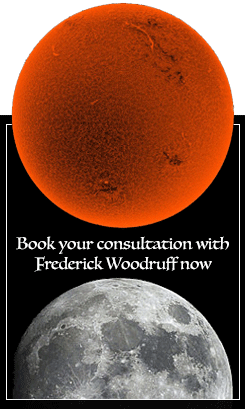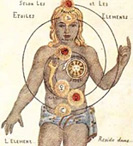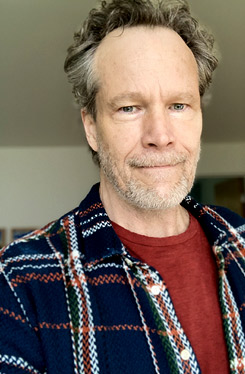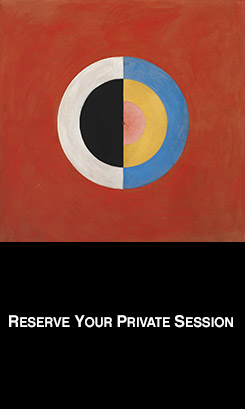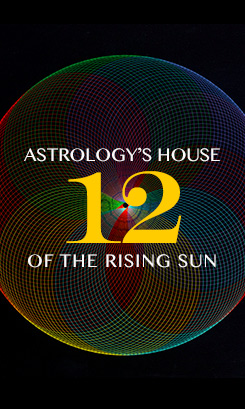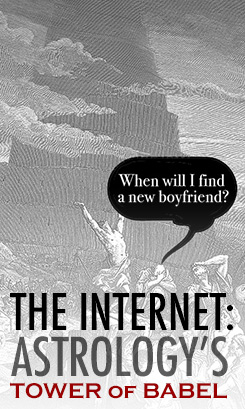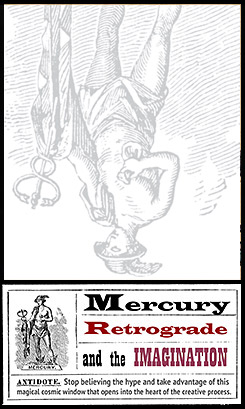As the Sun Moves into Scorpio…
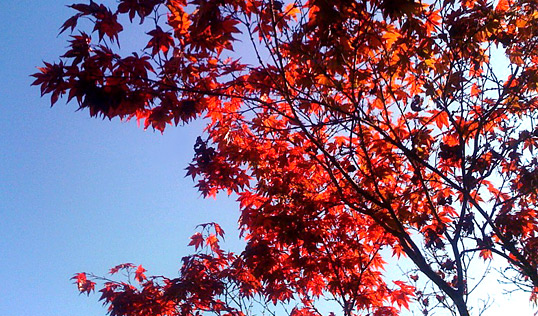
Today I visited the Japanese maple that is in my front yard. I stood alongside it for a good ten minutes. I wanted the tree to sense how much I appreciated its radiance, the incendiary tinge of the red and orange leaves. And with a clear sky, like today’s, the backdrop set the tree’s beauty into high relief.
Earlier I’d been with sheeny black creatures. Coming home from a walk I spied on a gathering of crows, about eight of them, swooping from their spot on a pine branch to take prime pickings from the neighbor’s recycling pile. One of the birds was so huge it resembled an infant, in a way — pitch black and hopping on all fours — with wings. Very disconcerting.
The crow’s coloring is so deep, it’s slightly metallic black and hypnotic. The blackness is as deep as their persistence. And I thought of a poem by the Hindi poet Mirabai that talks about her love for the Beloved’s black hair. She’s always writing about his hair. The vivid blackness — the sheen of it, and her getting lost in it.
The birds would argue about who got the choice bits from the bin, with the victor flying off to stash the picking in her nest. Eventually they got angry at my staring and started cawing aggressively. I laughed and walked down to see my maple and snapped the photo above. I hadn’t dressed warm enough so I finally went back into the house.
Perhaps because Pluto sits near my ascendant and with the moon and Saturn in Scorpio in my natal chart, I become vitalized as the season shifts towards the death space that typifies mid-Autumn. The Sun’s ingress into Scorpio.
Summer for me was like fathoms of void. Was there sun? And when the equinox came in September I hardly took notice. My heart was burgled and cut in June — and when the heart’s sore and shuttered there can be such an eerie disconnect from beauty. Dry. I could lean towards beauty, but beauty didn’t, wouldn’t, lean towards me. I think beauty could sense the veil and felt unwelcome. Or so the mind says — in reality when the heart, the eye of beauty is shut, beauty simply is not. Is asleep.
There’s a great Leonard Cohen song that tells about the frustration of trying to contrive one’s way towards beauty. Making beauty an object rather than seeing it as an essential expression of the Self.
I came so far for beauty.
I left so much behind.
My patience and my family.
My masterpiece unsigned.
I thought I’d be rewarded.
For such a lonely choice.
And surely she would answer
To such a very hopeless voice.
I practiced all my sainthood.
I gave to one and all.
But the rumours of my virtue
They moved her not at all.
The Sufis talk about reaching a place, after long pining and making efforts toward the Beloved, where the Beloved actually makes a turning — and suddenly the seeker becomes the sought. The notion is lovely except this process, where the Beloved comes after the seeker, is painful. Barren. Disorienting. One is dropped into a wasteland. The Sufis’ term for this phase, this displacement is called: constraint.
Al-HallÄj, the 10th-century Persian mystic, cataloged carefully and described in detail three phases of the path to God. In the first aspect one is in a phase of “novicehood.” This is a phase where one is making efforts. Which is to say the ego has a sense, like the Leonard Cohen song, of wanting beauty and going through various contortions to make the marriage happen. And of course it doesn’t. But there is the efforting, the seeking. It’s part of this recipe that Al-HallÄj detailed.
The second phase is that of constraint, what he called “passive purification.” Here, once one has abandoned his will, the seeker becomes the one who is aspired after. Here one loses all desires. The Beloved, being jealous, doesn’t tolerate hankerings that move the eye to other objects or people. Here one discovers how much desire dominates his life. Again, the notion is romantic, but with desire unplugged the upwelling of meaninglessness can be debilitating. This state of being cannot be attained by design; which is the entire point — one is being shown who is really in control. Restraint is purely given, is pure Grace.
The third phase is called the core of union. Oneness is experienced as an immutable state of being. In her amazing book The Taste of Hidden Things, Sufi writer Sara Sviri describes it as such: “…as a centered point of stillness where fluctuation ceases, where the “impulsive self” becomes the “serene self”.”
Reading about these states seems romantic, but to enter the second state, the phase of constraint which Al-HallÄj called idtirar, involves the deeper mysteries of suffering. Why suffering? Sviri writes:
So there’s a lot of waiting once one is in the second state. With desire on hold it takes powerful trust and a love of the truth to allow for the divestments. Ineffable things can help. Like music, learning to accept stillness, the phone not ringing much. No one “home”. And poetry is very good.
I suppose because I’m a gay man, I revel in Mirabai’s poems. Her descriptions of the Beloved are always rife with sinew, just reading a couple can move the force from my lower chakras directly up into my heart. As Robert Bly wrote: “When Mirabai comes to meet you, you’ll have to be prepared for excess.” I’m a drama queen, so I can dig it. He continues, “Her religious passion carried her into intensities that make most people turn pale.”
Consider:
I would like my own body to turn into a heap of incense and
sandalwood and you set a torch to it.
When I’ve fallen down to gray ashes, smear me on your shoulders
and chest.
Do.
But the poem I’d read this morning, before visiting the tree and the crows was this one called His Hair:
You play the flute well; I love your swing curls and your earlocks.
Jusumati, your mother, wasn’t she the one
Who washed and combed your beautiful hair?
If you come anywhere near my house,
I will close my sandalwood doors, and lock you in.
Mira’s lord is half lion and half man.
She turns her life over to the midnight of his hair.
Me too.
